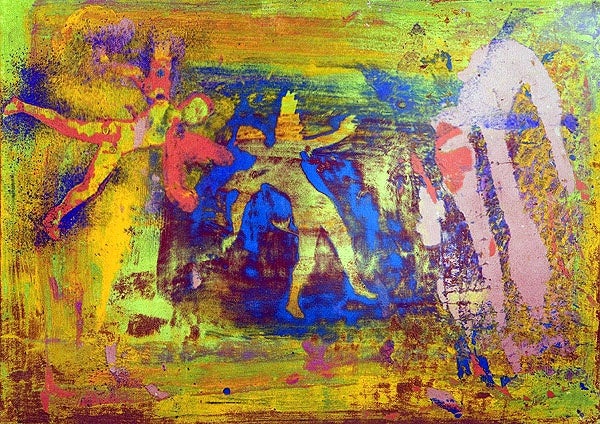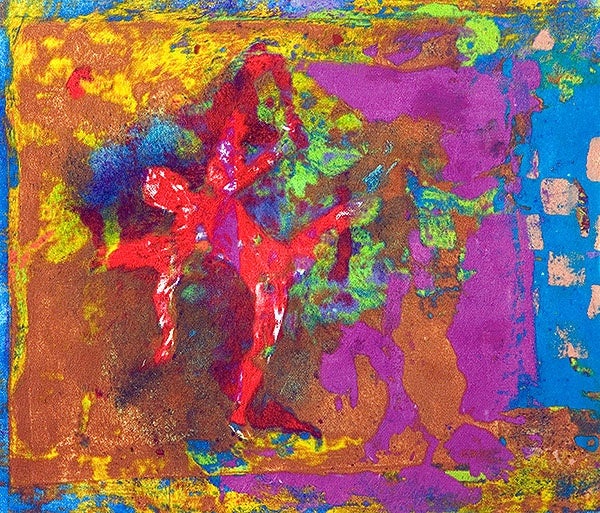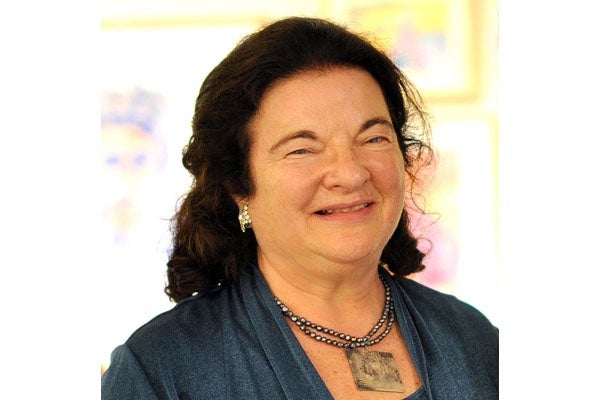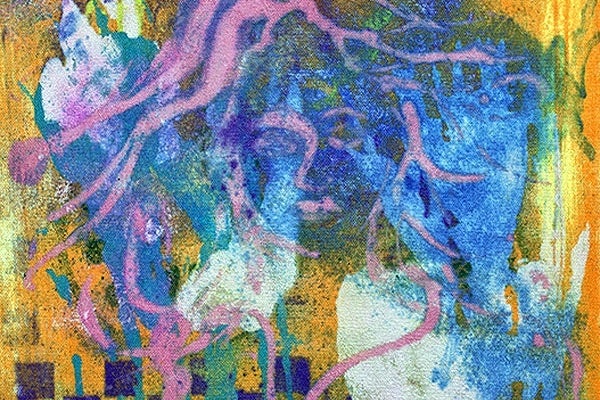Princeton artist connects to the dance of life
-

<p> Angels Among Us. Clay Monoprint 18”h x 26”w (Courtesy of the artist)</p>
-

<p>Potato prints. (Courtesy of the artist)</p>
-

<p>Priscilla Snow Algava (Courtesy of the artist)</p>
-

<p>Detail from a work in the exhibit. (Courtesy of the artist)</p>
Priscilla Snow Algava’s studio may be in the most enviable spot for an artist in Princeton. Her large glass windows look out on Witherspoon Street, and from her perch she draws and paints the bustling downtown. If she gets restless she can walk down 20 steps to Small World Coffee, where she often sits and sips and draws patrons.
With a mane of wavy black hair, the retired South Brunswick High School art specialist is often seen at regional gallery openings. She usually wears a necklace of large gemstones, each with a story. At an exhibit of outsider artists at the West Windsor Arts Center last year, Algava wore a favorite necklace from a trip to Greece, and when one of the artists admired it, she unclasped it from her own neck and offered it as a gift. Such is Algava’s spirit of generosity.
Not surprising to anyone who has seen her canvases, Algava loves color, and her clothing lets you know that. On this particular day she is wearing three different purples, not to mention the carved purple goddess face in an amulet around her neck. The studio is aromatic, like an herbal infusion, but Algava, who is getting over a cold, says it is the essential oils she has been using for healing.
In December, Algava opened her studio for a two-day sale, including the work of three other Princeton artists. She has only been in the space since August, but finds it ideal not only for its light and views, but its visibility: a sandwich board sign out front generated lots of traffic, and sales.
It is both working studio – there are Small World paper cups filled with pigment, and cans of brushes line the windowsills – as well as showroom, with many works of art lining the walls. This is Algava’s world – from figures in motion to old ladies sitting on a stoop in Greece, talking about their lives and the old days. “We barely spoke each other’s language, but we all related to one another,” she recounts of the time she discovered them. “We’re all citizens of the world who need to take responsibility for one another.”
On the floor, stacks of her framed artwork, wrapped in bubble wrap, are ready to be shipped off to the Marguerite & James Hutchins Gallery at the Lawrenceville School for Life Dance: A Retrospective, Priscilla Snow Algava, Feb. 7 through 28.
It’s a busy time for Algava, who had a solo show at the Plainsboro Library in fall, and has been teaching drawing and painting at the West Windsor Arts Center, watercolor at the YWCA Princeton, privately in her studio, and leading two-day workshops in clay mono-printing every few months. A recent workshop at WWAC was so popular, she had to turn three students away. Those who were lucky enough to get in were observed being absorbed in the play of the work, pouring pigment onto slabs of wet clay, mixing in slip, adding texture, then rolling it out onto a treated surface. Finished prints lay drying all over the classroom.
“Everyone can succeed and everyone comes away with four to five pieces of artwork,” says Algava. “Students learn so much from watching each other work.”
In 2007 Algava received a Dodge Foundation grant with which she created a community Mirror Mural, in which each student was given a four-inch mirror to create a representation of who they are. They could use stencil, writing or drawing to create the wall of 1,000 mirrors.
“I think everyone is an artist,” says Algava, who was moved by Ik-Joong Kang’s “Happy World” mural at the Princeton Public Library, a community produced artwork. For Mirror Mural, “The artist makes the tile, viewers sees themselves while connecting to the artist, and reflect on who they are inside.”
The artist Jacob Landau was a big influence on Algava. The two worked on a book on teaching and the humanities. “We need to take care of each other and the planet, and art is a vehicle for that. Unfortunately he died before the book was finished,” says Algava, who still has the notes and uses the word fragments in her art.
Landau taught Algava “how important it is to be passionate in making art, and how important the human being is as a subject. There’s a dialogue between the artist and the viewer and the work, a circle of reflection,” she says. “Each viewer brings something, sees something different, and that’s OK – that visceral response from a viewer makes art a vehicle for change.”
Painting is a dance for Algava. “I feel like I’m dancing with a brush. I don’t start with a plan. I’m intuitive – I don’t do a lot of thinking. I never feel ‘block,’ but I’m a fountain with so much to say and draw. I’m celebrating life and our circles of connection.”
Dance is also her subject. “I have been drawing dancers since my kids were little, and at rehearsals and ballet lessons I loved the discipline and rigor, how people would express themselves with their bodies.” Algava has her own private alchemy, mixing shampoo and cleansers into ink and oil pastel, causing them to behave with minds of their own – and often taking the shape of dancers.
After the interview, we descend the stairs to Small World – who can resist the aroma of joe? Algava treats me to a latte, and we sit at a table where she puts pen to sketchbook and makes quick studies of the people at the other tables, engaged with their laptops or devices, oblivious to the artist in their midst.
Life Dance: A Retrospective, Priscilla Snow Algava, is on view at the Marguerite & James Hutchins Gallery, Gruss Center of Visual Arts, the Lawrenceville School, Lawrenceville, Feb. 7 through 28. Opening reception Feb. 7, 6:30-8 p.m.
WHYY is your source for fact-based, in-depth journalism and information. As a nonprofit organization, we rely on financial support from readers like you. Please give today.




